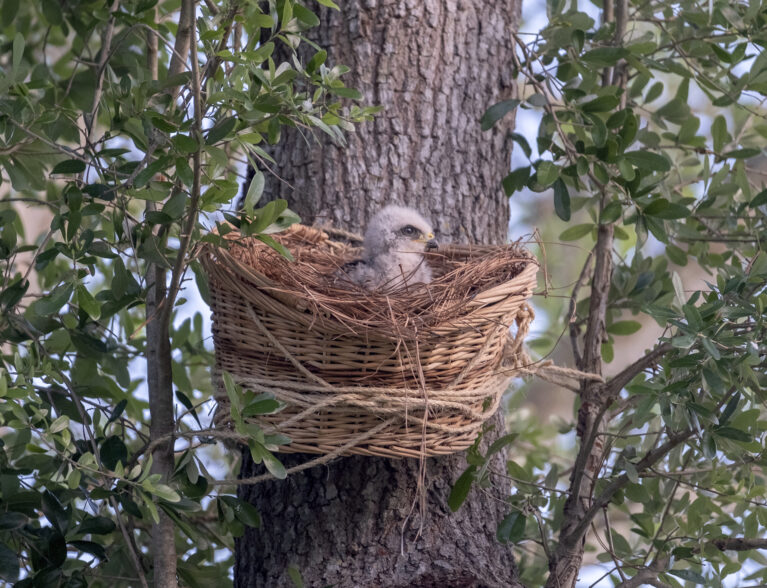
A Roseland neighborhood in northern Indian River County was on the edge of its collective seat for about a month following the drama of nursing an injured baby red-shouldered hawk back to life.
Thanks to the combined efforts of a group of neighbors and volunteers, it looks like the rescue operation was least partly successful.
After diligent care by its parents, the neighbors and an animal hospital in nearby Melbourne, the one surviving chick from a hawk’s nest has now left its “crib,” presumably to survive on its own.
The love affair between the neighborhood and the hawks that had lasted for several weeks cooled a bit at the end when the baby hawk’s parents aggressively defended their nest, buzzing and then physically attacking passersby who came too close.
Two residents suffered minor scalp wounds from hawk attacks when sharp talons scraped their heads.
But before the chick’s parents turned a little nasty, it was fun while it lasted. The one surviving baby chick had been reunited with its parents in a replacement nest installed 15 feet up in an oak tree by Mary Jo Awtrey, a Vero Beach resident and retired zookeeper from the Brevard Zoo and the former National Elephant Center in Fellsmere.
When Awtrey installed the nest two weekends ago, she predicted that the young bird would probably fledge – meaning it would be ready to fly on its own – in a week or so. Just like Awtrey had predicted, the bird did leave the nest under its own power.
Awtrey is one of the about 200 volunteers for the Florida Wildlife Hospital in Melbourne, a nonprofit that gets no funds from local, state or federal governments, survives on donations and never charges for its services. “After I retired, I get my animal fix caring for injured birds of prey,” Awtrey said.
The Roseland drama started last month when a strong spring windstorm blew through the area, knocking down a nest that housed two newborn baby chicks of the red-shouldered hawk species, a majestic-looking bird of prey. When they reach adulthood, the hawks are about 2 feet long but can have a wingspan of over 4 feet, and are blessed with extraordinarily sharp eyesight.
“These birds are not the greatest nest builders,” Awtrey explained. Red-shouldered hawks, who are not in any danger of extinction, are monogamous and tend to return to the same nest made of small sticks every year to raise their babies together.
The oak tree where this nest was located was on the property of David Block and his wife Kay on Grandin Avenue, but their next-door neighbor, Joyce Leach, who kept other interested residents updated on the drama on a neighborhood website, speculated that the nest was a new one because the couple’s old “home” probably disappeared when a new house was built in the area.
In the fall from the tree, one of the nest’s two chicks died, and Leach says it was “heartbreaking” to see the parents, who did not realize their baby was dead, still coming back every day trying to feed the dead baby with pieces of rats, mice and other prey they had hunted during the day.
“When they finally realized their baby would not come back to life,” Leach said, “we saw the parents console each other. One of the birds rested its head against the shoulder of its mate.
They looked so much like grieving parents. You could almost hear one of them cry, and the other one saying, ‘I’m so sorry’.”
One volunteer from the neighborhood drove the other chick, which had survived the fall with minor injuries, to the animal hospital in Melbourne (there is no such facility in Indian River County), where the chick was cared for, fed and nurtured for four days in a special cage.
That’s when Awtrey entered the picture at the request of the hospital to return the baby bird to the Sebastian oak tree in a donated basket that would serve as a replacement nest. She had experience re-nesting birds of prey, and with the help of an extension ladder, she managed to securely tie the nest to the same tree about 15 feet up.
“I guess I’m the only one of the volunteers who’s not afraid of heights and who’s crazy enough to go up on a 15-foot ladder,” she explained with a laugh.
Awtrey stressed that in a rescue operation of this kind, time is of the essence since the parents need to come back to their baby to feed it without delay.
The whole neighborhood held its collective breath the night of Sunday, March 31, when neighbors heard the baby bird crying. It was hungry and looking for food, but the parents did not return to the nest that evening. Would they be able to find the replacement nest, recognize it as their home, and resume feeding their surviving baby?
The next morning, on April Fool’s Day, the neighborhood heaved a collective sigh of relief after Leach reported that the parents had indeed returned and fed their baby at dawn.
“The crying stopped,” Leach said. “The baby was OK again.” When Leach went out early in the morning to walk her dog, she said she noticed that the parents were guarding their nest closely. One of the parents was in the nest with the baby, while the other flew around to buzz away any intruders who dared come too close.
“It was too bad about those bird attacks on the people, but it has been a very emotional journey for all of us involved in this,” said Leach. “It was heart-rending. But in the end, it was awesome to bring this family of birds back together.
“I’m an avid bird watcher and I’ve been on birding trips with members from the Audubon Society at Grand Harbor and the Vero Beach Country Club,” Leach added. “But this drama captured the imagination of the whole neighborhood, not just the dedicated birdwatchers.”



